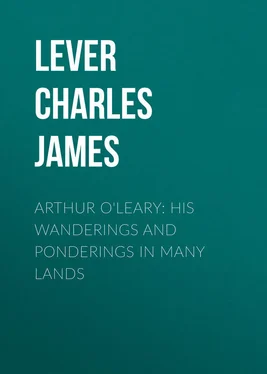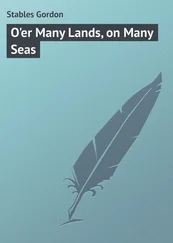Charles Lever - Arthur O'Leary - His Wanderings And Ponderings In Many Lands
Здесь есть возможность читать онлайн «Charles Lever - Arthur O'Leary - His Wanderings And Ponderings In Many Lands» — ознакомительный отрывок электронной книги совершенно бесплатно, а после прочтения отрывка купить полную версию. В некоторых случаях можно слушать аудио, скачать через торрент в формате fb2 и присутствует краткое содержание. Издательство: Иностранный паблик, Жанр: literature_19, foreign_antique, foreign_prose, на английском языке. Описание произведения, (предисловие) а так же отзывы посетителей доступны на портале библиотеки ЛибКат.
- Название:Arthur O'Leary: His Wanderings And Ponderings In Many Lands
- Автор:
- Издательство:Иностранный паблик
- Жанр:
- Год:неизвестен
- ISBN:нет данных
- Рейтинг книги:3 / 5. Голосов: 1
-
Избранное:Добавить в избранное
- Отзывы:
-
Ваша оценка:
- 60
- 1
- 2
- 3
- 4
- 5
Arthur O'Leary: His Wanderings And Ponderings In Many Lands: краткое содержание, описание и аннотация
Предлагаем к чтению аннотацию, описание, краткое содержание или предисловие (зависит от того, что написал сам автор книги «Arthur O'Leary: His Wanderings And Ponderings In Many Lands»). Если вы не нашли необходимую информацию о книге — напишите в комментариях, мы постараемся отыскать её.
Arthur O'Leary: His Wanderings And Ponderings In Many Lands — читать онлайн ознакомительный отрывок
Ниже представлен текст книги, разбитый по страницам. Система сохранения места последней прочитанной страницы, позволяет с удобством читать онлайн бесплатно книгу «Arthur O'Leary: His Wanderings And Ponderings In Many Lands», без необходимости каждый раз заново искать на чём Вы остановились. Поставьте закладку, и сможете в любой момент перейти на страницу, на которой закончили чтение.
Интервал:
Закладка:
For twenty minutes and more, Sir Peter abused the Dutch; he called them hard names in English, and some very strong epithets in bad French. Meanwhile, his courier busied himself in preparations for departure, and the “Honourable Jack” undertook to shawl the young ladies, a performance which, whether from the darkness of the night, or the intricacy of the muffling, took a most unmerciful time to accomplish.
“We shall never find the hotel at this hour,” said Sir Peter, angrily.
“The house will certainly be closed,” chimed in the young ladies.
“Take your five to two on the double event,” replied Jack, slapping the Alderman on the shoulder, and preparing to book the wager.
I did not wait to see it accepted, but stepped over the side, and trudged along the “Boomjes,” that long quay, with its tall elm trees, under whose shade many a burgomaster has strolled at eve, musing over the profits which his last venture from Batavia was to realize; and then, having crossed the narrow bridge at the end, I traversed the Erasmus Plata, and rang boldly, as an old acquaintance has a right to do, at the closed door of the “Schwein Kopf.” My summons was not long unanswered, and following the many-petticoated handmaiden along the well-sanded passage, I asked, “Is the Holbein chamber unoccupied?” while I drew forth a florin from my purse.
“Ah, Mynheer knows it then,” said she, smiling. “It is at your service. We have had no travellers for some days past, and you are aware, that, except greatly crowded, we never open it.”
This I knew well, and having assured her that I was an habitué of the Schwein Kopf, in times long past, I persuaded her to fetch some dry wood and make me a cheerful fire, which, with a “krug of schiedam” and some “canastre,” made me as happy as a king.
The “Holbeiner Kammer” owes its name, and any repute that it enjoys, to a strange, quaint portrait, of that master seated at a fire, with a fair headed, handsome child, sitting cross-legged on the hearth before him. A certain half resemblance seems to run through both faces, although the age and colouring are so different. But the same contemplative expression, the deep-set eye, the massive forehead and pointed chin, are to be seen in the child, as in the man.
This was Holbein and his nephew, Franz von Holbein, who in after years served with distinction in the army of Louis Quatorze. The background of the picture represents a room exactly like the chamber – a few highly-carved oak chairs, the Utrecht velvet-backs glowing with their scarlet brilliancy, an old-fashioned Flemish bed, with groups of angels, neptunes, bacchanals, and dolphins, all mixed up confusedly in quaint carving; and a massive frame to a very small looking-glass, which hung in a leaning attitude over the fire-place, and made me think, as I gazed at it, that the plane of the room was on an angle of sixty-five, and that the least shove would send me clean into the stove.
“Mynheer wants nothing?” said the Vrow with a courtsy.
“Nothing,” said I, with my most polite bow.
“Good night, then,” said she; “ schlaf wohl , and don’t mind the ghost.”
“Ah, I know him of old,” replied I, striking the table three times with my cane. The woman, whose voice the moment before was in a tone of jest, suddenly grew pale, and, as she crossed herself devoutly, muttered – “ Nein! Nein! don’t do that;” and shutting the door, hurried down stairs with all the speed she could muster.
I was in no hurry to bed, however. The “krug” was racy, the “canastre” excellent: so, placing the light where it should fall with good effect on the Holbein, I stretched out my legs to the blaze; and, as I looked upon the canvas, began to muse over the story with which it was associated, and which I may as well jot down here, for memory’s sake.
Frank Holbein, having more ambition and less industry than the rest of his family, resolved to seek his fortune; and early in the September of the year 1681, he found himself wandering in the streets of Paris, without a liard in his pocket, or any prospects of earning one. He was a fine-looking, handsome youth, of some eighteen or twenty years, with a sharp, piercing look, and that Spanish cast of face for which so many Dutch families are remarkable. He sat down, weary and hungry, on one of the benches of the Pont de la Cité, and looked about him wistfully, to see what piece of fortune might come to his succour. A loud shout, and the noise of people flying in every direction, attracted him. He jumped up, and saw persons running hither and thither to escape from a calèche, which a pair of runaway horses were tearing along at a frightful rate. Frank blessed himself, threw off his cloak, pressed his cap firmly upon his brow, and dashed forward. The affrighted animals slackened their speed as he stood before them, and endeavoured to pass by; but he sprang to their heads, and with one vigorous plunge, grasped the bridle; but though he held on manfully, they continued their way; and, notwithstanding his every effort, their mad speed scarcely felt his weight, as he was dragged along beside them. With one tremendous effort, however, he wrested the near horse’s head from the pole, and, thus compelling him to cross his fore-legs, the animal tripped, and came headlong to the ground with a smash, that sent poor Frank spinning some twenty yards before them. Frank soon got up again; and though his forehead was bleeding, and his hand severely cut, his greatest grief was, his torn doublet, which, threadbare before, now hung around him in ribbons.
“It was you who stopped them? – are you hurt?” said a tall, handsome man, plainly but well dressed, and in whose face the trace of agitation was clearly marked.
“Yes, sir,” said Frank, bowing respectfully. “I did it; and see how my poor doublet has suffered!”
“Nothing worse than that?” said the other, smiling blandly. “Well, well, that is not of so much moment. Take this,” said he, handing him his purse; “buy yourself a new doublet, and wait on me to-morrow by eleven.”
With these words the stranger disappeared in a calèche, which seemed to arrive at the moment, leaving Frank in a state of wonderment at the whole adventure.
“How droll he should never have told me where he lives!” said he, aloud, as the bystanders crowded about him, and showered questions upon him.
“It is Monsieur le Ministre, man – M. de Louvois himself, whose life you’ve saved. Your fortune is made for ever.”
The speech was a true one. Before three months from that eventful day, M. de Louvois, who had observed and noted down certain traits of acuteness in Frank’s character, sent for him to his bureau .
“Holbein,” said he, “I have seldom been deceived in my opinion of men – you can be secret, I think.”
Frank placed his hand upon his breast, and bowed in silence.
“Take the dress you will find on that chair: a carriage is now ready, waiting in the court-yard – get into it, and set out for Bâle. On your arrival there, which will be – mark me well – about eight o’clock on the morning of Thursday, you’ll leave the carriage, and send it into the town, while you must station yourself on the bridge over the Rhine, and take an exact note of everything that occurs, and every one that passes, till the cathedral clock strikes three. Then, the calèche will be in readiness for your return; and lose not a moment in repairing to Paris.”
It was an hour beyond midnight, in the early part of the following week, that a calèche, travel-stained and dirty, drove into the court of the minister’s hotel, and five minutes after, Frank, wearied and exhausted, was ushered into M. de Louvois’ presence.
“Well, Monsieur,” said he impatiently, “what have you seen?”
Читать дальшеИнтервал:
Закладка:
Похожие книги на «Arthur O'Leary: His Wanderings And Ponderings In Many Lands»
Представляем Вашему вниманию похожие книги на «Arthur O'Leary: His Wanderings And Ponderings In Many Lands» списком для выбора. Мы отобрали схожую по названию и смыслу литературу в надежде предоставить читателям больше вариантов отыскать новые, интересные, ещё непрочитанные произведения.
Обсуждение, отзывы о книге «Arthur O'Leary: His Wanderings And Ponderings In Many Lands» и просто собственные мнения читателей. Оставьте ваши комментарии, напишите, что Вы думаете о произведении, его смысле или главных героях. Укажите что конкретно понравилось, а что нет, и почему Вы так считаете.












